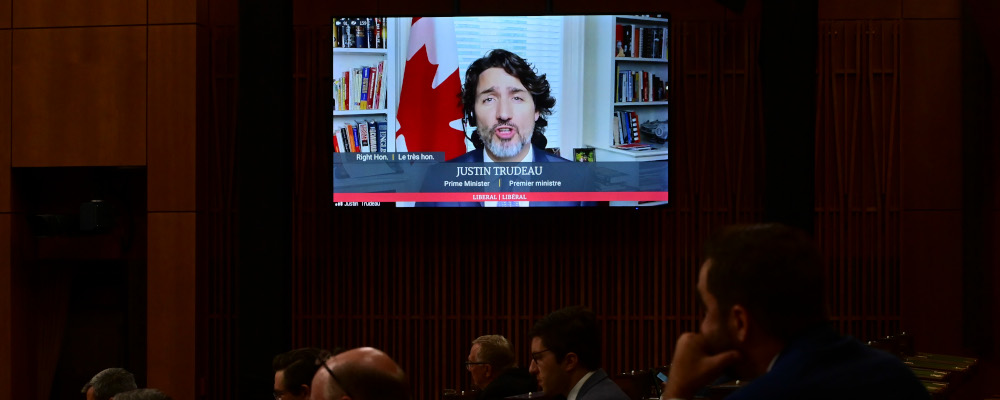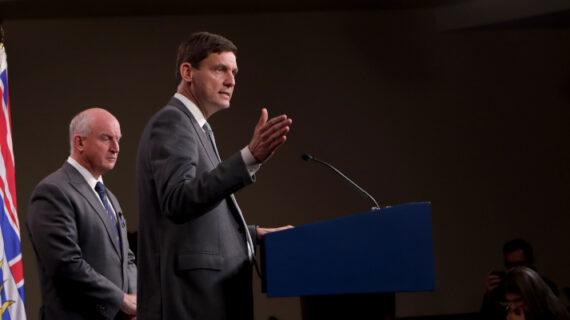In a recent Hub Dialogue, host Sean Speer and regular guest David Frum discussed certain failings of the current Canadian political system. While much of their criticism—especially of the Liberal government’s monstrous experiment in hybrid parliament—was spot on, some of the claims about the government’s dominance of Parliament went too far. In this short essay, I offer a modest response to the oft-proclaimed death of responsible government by shedding light on the complementary features of what I call responsive government, which is still very much alive but imperilled by the vices of virtual parliament.
Accountability is not a word generally associated with the executive in the Westminster system. This is not a new prejudice—more than a century ago, Walter Bagehot claimed that an English minister “may wield his authority…with as little chance of being called to account as an Eastern despot or French emperor”—but it is a persistent one. This attitude is especially notable among legal commentators and political scientists, and in his recent book Ian Brodie wryly mimicked the general impression of an isolated and puissant executive: “Canada’s prime minister is a dictator. The Sun King of Canadian government…He governs with the help of a few-hand-picked advisors or ‘courtiers,’ like Zeus aloft in the clouds sending lightning bolts from on high into government departments.”
Such lurid accounts of government power misunderstand the complexity of the executive and the varieties of its accountability. Far from being unaccountable, a government in the modern Westminster system is hemmed in on all sides by mechanisms of accountability: it can hardly think, let alone act, without considering how it will be accountable for its decisions in myriad ways to myriad institutional actors and political constituencies. Bagehot was wrong. No “Eastern despot or French emperor” ever had to stare down the opposition at the despatch box or navigate a bank of microphones and cameras on his way to his car in the grip of scandal. Although the methods of accountability can be parsed in different ways, they can be divided into two broad categories: the formal mechanisms of responsible government and the less formal processes of what I call responsive government. Both forms of accountability are undermined by the normalisation of “virtual” parliament, but especially the subtle processes of responsive government, which depend on private, personal interactions between parliamentarians.
Few aspects of the Westminster system have been more discussed, dissected, and disputed than the principle of responsible government, so I will only touch lightly on the subject before focusing on the overlooked and under-appreciated virtues of responsive government. In a classic work on responsible government, Anthony Birch distinguished between three senses in which a government may be considered “responsible”: it should be “responsive to public opinion,” “prudent and consistent” in its pursuit of policy, and “accountable to the representatives of the electors.” All three senses of the word are relevant to representative government, but only the third is unique to parliamentary government as it captures the convention by which ministers are accountable to Parliament individually and collectively. It is the pairing of the House’s role in forming (and unforming) government with the government’s power to dissolve Parliament that gives the idea of responsible government teeth. Together, these powers ensure that the cabinet and Parliament work together under the ever-present and chastening threat of the ultimate sanction of dissolution by one or the other.
Parliament’s ability to withdraw its confidence is made possible by the partial fusion of the executive and the legislative powers within Parliament, which Bagehot called our system’s “efficient secret.” If the cabinet were not embedded within Parliament, the withholding of confidence or supply by Parliament would result in a stand-off with the executive of the kind we sometimes see in presidential systems, without the possibility of a new government. The partial fusion of the parliamentary system, by contrast, requires both branches to work together in a process that keeps the executive accountable in real-time. Unlike in a presidential system, where the executive is accountable only intermittently through elections, a government in the Westminster system is always indirectly accountable to Parliament, where it is subject to constant critical examination by the members sitting across from, and sometimes behind, it. This encourages a government to be responsive between elections, and not just in anticipation of them. To survive, a government must continually tune its agenda and adjust its policies to accommodate the changing preferences of the legislature. To act, it must persuade the legislature, or accede to it.
This brings us to the notion of responsive government, by which I mean to distinguish from the formal mechanisms of responsible government all the informal ways in which governments are influenced by the legislature—particularly, but not exclusively, by members of its own party—as well as by the electorate between elections. Responsible government is a public exercise of power that follows established (if occasionally disputed) formal processes, while responsive government operates informally and usually well out of sight of the floor House of Commons. The distinction between responsible and responsive government is not, however, as simple as the distinction between what happens in public and what happens in private, or between what is written down (in the constitution, statute, or convention) and what must be read between the lines of the law. Although these differences are often characteristics of responsible and responsive government, respectively, it is not the differences between them that matter so much as their interdependence. To put it another way, if responsible government is the principle that the government and its ministers must maintain the confidence of the House, then responsive government is the practice of how a government maintains that confidence.
The work of responsive government is sometimes reported in the media, but these reports are often misleading because strategic use of the media is part of the informal processes of responsive government. What is printed is usually what one or more parties within the private process want to be made public. To really understand responsive government, one needs to know what happens in the government lobby, the cabinet room, the hallways of Parliament and the prime minister’s office, and over drinks in the bars, restaurants, and private drawing rooms of the capital. For this, one must look to less traditional sources, including political memoirs, private diaries, biographies, and interviews with retired politicians and civil servants. It is not necessary to credit the particulars of individual revelations to note that accounts of back-room politics consistently show how, if responsible government joins the executive and the legislature, responsive government provides the ligaments that allow for effective play in the joint. Nor is it hard to see how allowing parliamentarians to dial in to work remotely from their homes across thirteen provinces and six time zones would severely constrain this work.
Harvey Mansfield has theorised in the American context that “the weak, formal executive” that purports only to execute the laws “is an aid to the strong, informal executive.” The apparently subservient term “executive,” he says, “connote[s] not weakness but the semblance of weakness, a presumed drawing of its own strength from the strength of another.” Mansfield calls this the “ambivalence” of the executive, by which the “pretense of ‘executing’ another’s wishes” makes palatable its assertions of power, especially in a democratic age. In the Westminster system, however, this subservience is not mere semblance or pretence. The executive depends at all times on the general support of the legislature as well as on its specific assent to the legislation that promotes the government’s political agenda. Even a government that commands a majority of the House, for whom maintaining confidence should be a formality (in both senses), must sustain the informal confidence of its party caucus in order to legislate effectively.

The executive’s power is thus ambivalent in the Westminster system, but in a more practical and less surreptitious sense than Mansfield’s. The executive cannot act outside its narrowly circumscribed prerogative powers without the approval of the legislature, and it cannot act at all without considering the reaction of the legislature that keeps it in power. Parliament simultaneously empowers and subordinates the government, which means that in order to exercise power the government must remain alert and responsive at all times to the interests and opinions of a range of elected and unelected persons. A parliamentary government follows, even as it leads.
The government’s need to pay constant attention to party, Parliament, and public opinion confounds the idea of the government as a parliamentary dictator with party discipline flowing in only in one direction, from the government to the backbenches. It also undermines the longstanding criticism that the rise of parties has created an executive-dominated legislature in which individual members have no will, much less power, of their own. That view focuses too much on the product of what happens and not enough on the process of how it happens. It assumes that because government legislation is almost always enacted, a servile legislature is dominated by the executive. One could, however, just as easily draw the opposite inference. As Anthony McGann has pointed out, “if the legislature was to find an agent that perfectly implemented its wishes, then [it would look as though] the legislature was a rubber stamp.” The reality is that neither side dominates the other, and this genuine ambivalence produces a creative tension between the government and the legislature.
Even with the backing of a parliamentary majority, a government must pay careful attention to its own side of the aisle. Parties are not monolithic entities but coalitions of factions, and vigorous private debates among the diverse members of national parties belie their apparent public uniformity. Regional and ideological differences, such as those between deficit hawks, foreign policy doves, and the rest of the political aviary, drive divisions within a party over a specific policy or more generally. Every member is acutely attuned to his or her own re-election prospects and a government that fails to listen to the fears of its members, particularly those in vulnerable seats where elections are won and lost, risks rebellion in the short term and electoral defeat in the long term. Divisive or unpopular policies can be avoided or moderated if enough members speak out internally, and discontented members and ministers can party discipline to their advantage behind the scenes to force changes to a bill before it is introduced, or amendments after. Few ministers or prime ministers relish fighting with their colleagues and a brewing backbench rebellion, or in extreme cases a well-timed threat of resignation, can influence policy formation by making a private political concession the price of maintaining the public appearance of party unity. All of these internal pressures add up to what Brodie calls “[t]he informal constraints” on the prime minister’s power.
“A parliamentary government follows, even as it leads.”
The government is also subject to constant scrutiny outside parliament: indirectly through the traditional media in the form of interviews, media scrums, and shouted questions; directly through town halls, public meetings with voters, and protests; and personally via the vulgar immediacy of social media. This scrutiny is aided by transparency legislation that requires the public disclosure of documents and, in some cases, private correspondence, emails, and electronic messages from within government. And in addition to being their own form of scrutiny, reports by officers and agents of Parliament who have been empowered to examine the workings of government also fuel scrutiny from the opposition, the media, and the public. All these forms of accountability reinforce each other. Parliamentary and extra-parliamentary scrutiny combine to influence the government’s conduct or at least force it to justify its actions and decisions, including to members of its own party whose influence behind closed doors can create enough private pressure to cause it to change course publicly.
More than a century ago, Sidney Low lamented that the rise of mass democracy meant that, “for the control of Parliament, which was supposed to be regular, steady, and constant, is exchanged the control of the electorate, which is powerful, but intermittent.” The reality is more complicated; the exchange less complete. In spite of the rise of popular democracy, and perhaps buoyed by it, the “regular, steady, and constant” political dialogue between the government and the legislature persists. The formal mechanisms of responsible government, including elections, may be intermittent, but the work of responsive government keeps the spirit of responsible government alive in the meantime. But because responsive government operates through personal contact and private pressure, it works best if government ministers have to look their parliamentary colleagues in the eye in the government lobby and feel their censorious stares from the benches behind them in the House. Remote Parliament removes much of the tension between ministers and Parliament, which weakens the link between government and the governed.




